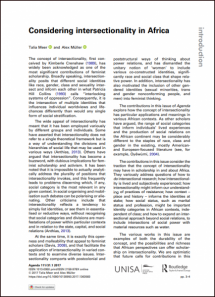Considering Intersectionality in Africa
This is an entire issue of the journal Agenda (Volume 31, Issue 1) which focuses on intersectionality and gender in Africa.
The contributions in this issue consider the traction that the concept of intersectionality may have in scholarship in and about Africa. They variously address questions of how to do intersectional research; how intersectionality is lived and subjectively experienced; how intersectionality might inform our understanding of practices of resistance; how context – place and history – informs the identities at stake; how social status, such as marital status and profession, might be important identity categories in African contexts, independent of class; and how to expand an intersectional approach beyond social relations, to include intersections of social power with material resources such as water.
The various works in this issue are examples of both the durability of the concept, and the possibilities and richness that African perspectives can offer scholarship on intersectionality. We are optimistic that future calls for contributions in this area will elicit inputs from a wider range of African contexts.
Source: Agenda
Date of Publication: April 7, 2021
SIMILIAR RESOURCES
Tools
Examples
- Intersectionality 101
- What Does it Mean to Leave No One Behind? A United Nations Development Programme Discussion Paper and Framework for Implementation
- Intersecting inequalities: Gender Equality Index
- 10 Best Resources on Intersectionality with an Emphasis on Low- and Middle-Income Countries
- Generic Algorithm to Aid Action Planning at District and Regional Levels
- “Because my Husband and I Have Never Had a Baby Before…” Results and Lessons from Interventions with First-Time Parents in Madagascar, Mozambique, and Nigeria
- What is Intersectionality?
- Kimberlé Crenshaw: What is Intersectionality?
- Factors Impacting Use of Health Services by First-time/Young parents: A Formative Research Toolkit
- Plan Stratégique National de Plaidoyer en matière de lutte contre le Paludisme (PSNPP) en Côte d'Ivoire 2018-2023

